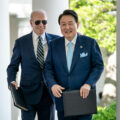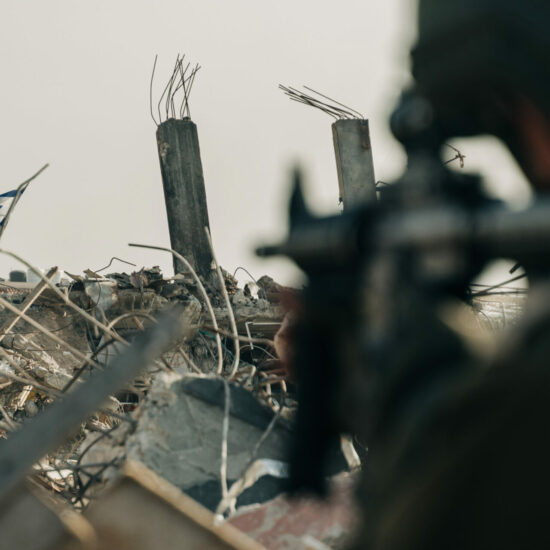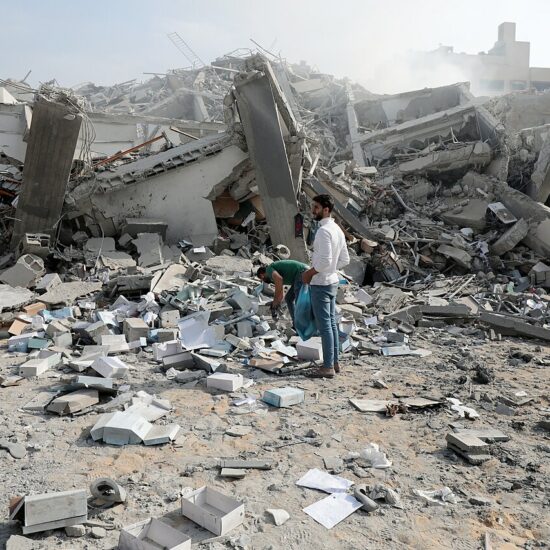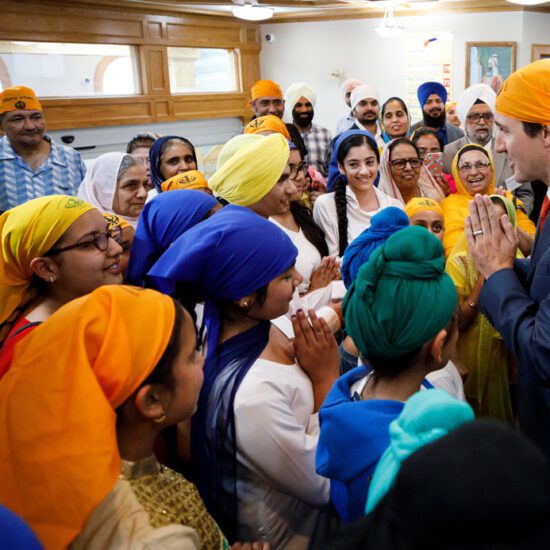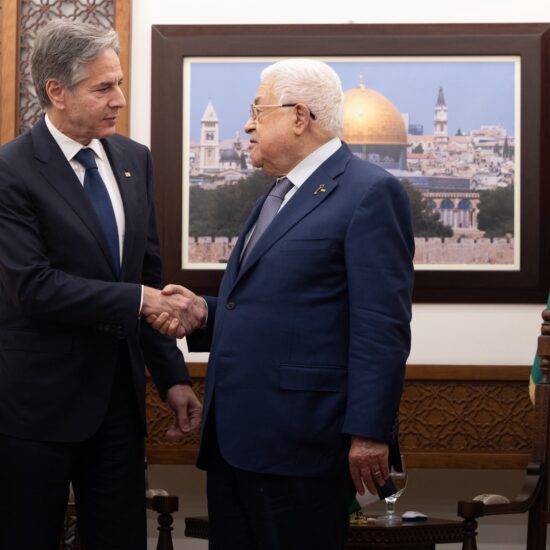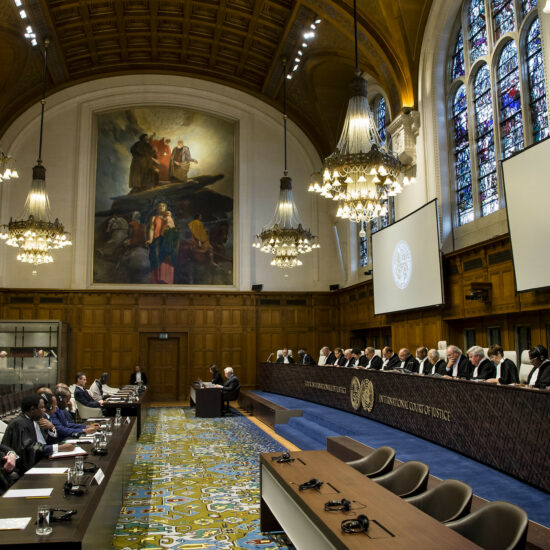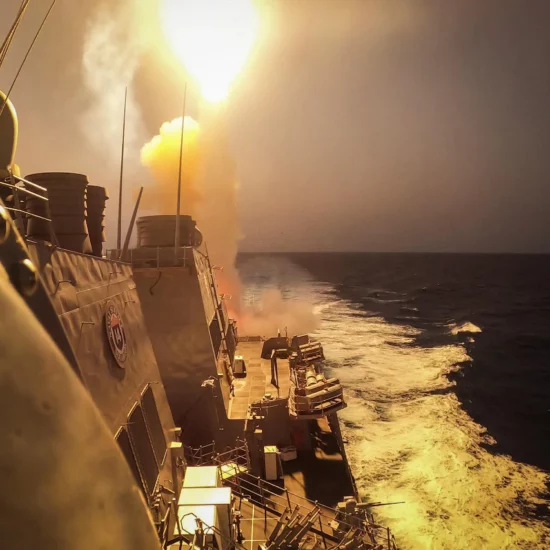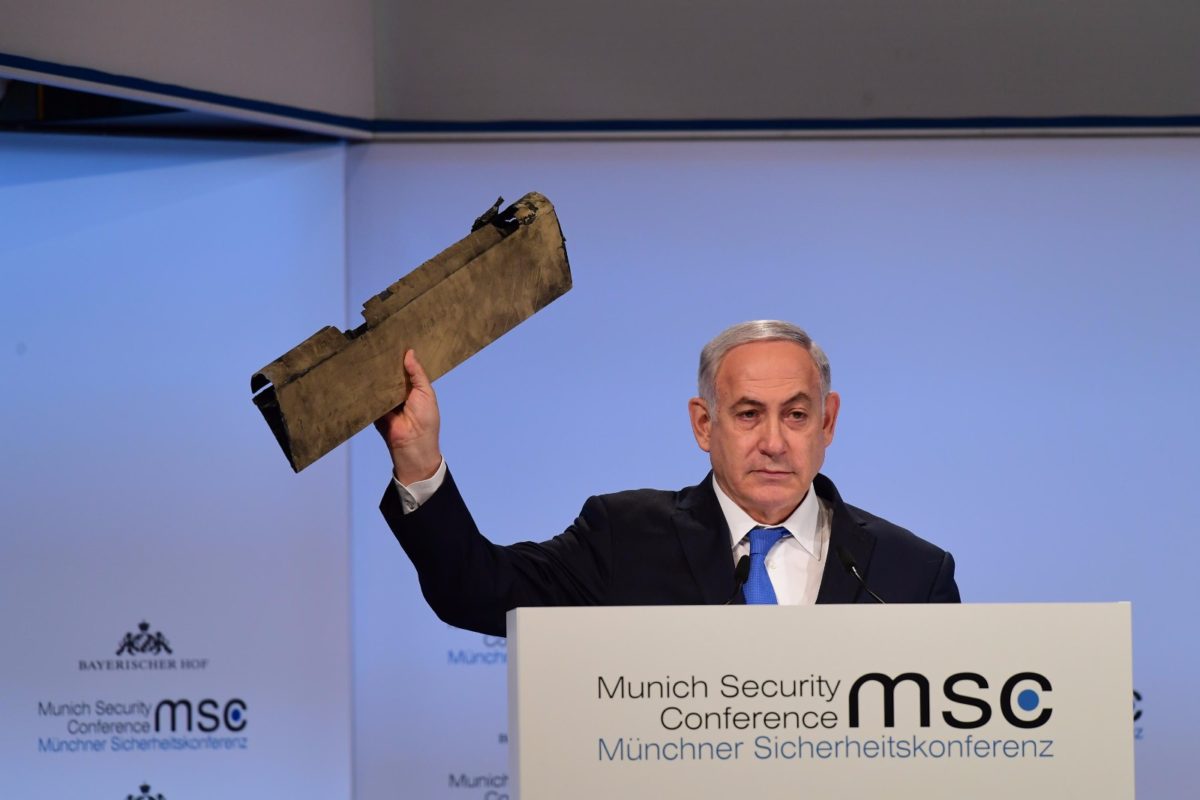
Israeli Prime Minister Benjamin Netanyahu brandishes a piece of an armed Iranian drone that the Israel Air Force shot down after it infiltrated Israeli airspace from Syria. Munich Security Conference, February 2018. By Amos Ben Gershom, Israel Government Press Office
Iran has been an eternal part of the political narrative in Israel where political parties, particularly the Likud Party under the leadership of Netanyahu has heavily relied on the “Iranian Threat” as a fear mongering tactic to attract voters for elections.
By Reza Yeganehshakib
Last week, Israeli Attorney General Avichai Mandelblit announced Prime Minister Benjamin Netanyahu to be formally indicted on charges relating to three cases of financial and political misconduct, carrying the possibility of jail time. While the media has largely focused on his scandals within the Isreali domestic affairs, it is also important to shed light on Netenyahu’s misuse of a foreign country, Iran, to shape the domestic politics inside the country.
Iran has been an eternal part of the political narrative in Israel where political parties, particularly the Likud Party under the leadership of Netanyahu has heavily relied on the “Iranian threat” as a fear-mongering tactic to attract voters for elections. Every election, Netenyahu’s narrative revolves around him being the only capable leader to deter the Islamic Republic. However, the Iranian threat narrative no longer seems to be working well for him after Israeli media also revealed his involvement in a “secret deal” that benefited Iran. But what role Iran could possibly play in a deal that Netanyahu claims to reinforce the security of Israel?
The story dates back to the Cold War era when the Iranian government purchased significant shares of a German leading steel company called Thyssen in 1974. Iran’s investment in the company was part of the country’s broader strategy to avoid inflation and damages to its economy. This was mainly a response to an unprecedented inflow of cash into the economy as a result of a sudden rise in the price of crude oil following the Arab oil embargo in 1973. Consequently, the government decided to massively invest its surplus in several overseas giant corporations such as Thyssen. In this case, they bought more than 24% of the company’s shares, which was later reduced with the involvement of a merger company after the Iranian Revolution.
In March 1999, Thyssen officially merged with Krupp, a 400-year old German steel and weapon manufacturer that is known for its battleships, tanks, and U-boats. Resultantly, the Islamic Republic of Iran suddenly became a major shareholder of an international giant battleship and modern weapon manufacturer. Yet, this partnership didn’t live long as the United States used its influence to end Iran’s partial ownership of this company.
In May 2003, President George W. Bush’s pressured Europe to restrict their economic ties with Iran as part of the US containment strategy against Iran. Hence, Thyssenkrupp was forced to repurchase 16.9 million shares of its Iranian partner as well as Iran Foreign Investment Company (IFIC) for $437 million. This reduced Iran’s share from 24% to 4.5%, pleasing the Americans while leaving the Germans very unsatisfied with the outcome. They forcefully made great concessions to the Iranians and faced a consequent adverse impact on their stockholders’ equity as well as the company’s overall assets. Despite making concessions, Washington negatively responded to the company’s request to be reimbursed for their loss in this one-sided deal with Tehran.
The story attracted the media attention after Yedioth Ahronoth, Israel’s most-read newspaper, reported on the Islamic Republic being a minority shareholder in Thyssenkrupp. This expectedly became controversial, considering Israel recently signed a contract with the same company to purchase three submarines.
This later led to Attorney General open an investigation into Prime Minister Netanyahu’s personal attorney, David Shimron who convinced Prime Minister to sign a $1 billion deal with Thyssenkrupp that Shimron himself was representing in Israel. This did not go as easy for the government that was already struggling with another scandal related to Iran.
In August 2016, Swiss high-level court ruled Israel to pay Iran an approximate amount of $1.1 billion-plus interest in order to cover Iran’s loss for its shares in the Eilat-Ashkelon Pipeline Company (EAPC). This company was founded in 1968 to pump Iran’s oil from the Red Sea to the Mediterranean Sea. However, Iran received no benefits from the operations of the pipeline, which has been active since its creation.
What is clear is that Israel is quite pragmatic and business-minded when it comes to making deals with the so-called “enemy”. Whether it is delivering weapons to Tehran in Iran-Contra affairs or partaking in deals that benefit Iran, Likud party has managed to simultaneously run effective and fear-based anti-Iran campaigns while benefiting from deals associated with Iran. Netanyahu has surely been the mastermind behind such campaigns as he cleverly deviated attention from crucial internal issues such as housing crisis, unemployment, and failure to make peace with the Palestinians, and diverted it all to the Iranian threat in order to sway public opinion in his favour. However, his recent indications along with the marginal victory of Blue and White Alliance prove that the Netenyahu’s Iran story will not work forever; and the Likud party, especially after Neteyahu’s departure, needs to redesign its strategy based on internal matters if it wants to remain in power.
Reza Yeganehshakib is an Associate Faculty in the Department of History with a specialization in the Middle East and World History at Saddleback College and Santa Monica College.

